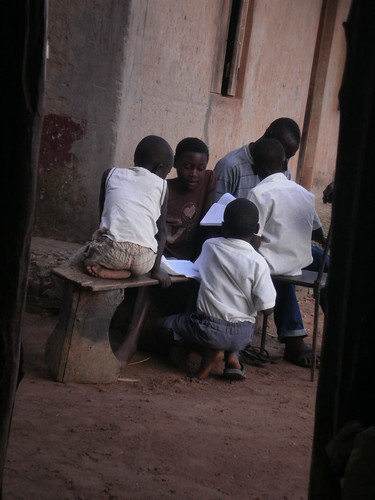I just successfully survived my first and hopefully my last illness in Uganda. I had some pretty terrible cough and throbbing headaches that lasted for a couple days. After fully recovering from whatever disease I had, I was shocked to discover how common the word malaria is used in Uganda. It has become part of the country’s vernacular. For example, one of my many conversations usually goes like this: “Where is Robert, I haven’t seen him all day at work?” “Oh, he’s out with malaria or he’s at the clinic being tested for malaria.” This type of conversation is very normal with my host family, co-workers and even with people I interact with from the community. To fully understand how common malaria is in Uganda, within the short time I’ve been here, all 7 members of my host family have contracted this disease. Two of my host sisters were even sent back home from school because they had malaria.
To avoid getting sick with malaria, every morning after breakfast I pop a pill of Doxycycline, which also has its perks of keeping my skin smooth and youthful. However, the sad reality is that most people in Uganda can’t afford to buy anti-malaria pills. While talking to a local community member, he told me that whenever he buys malaria pills he prays before taking it. And then he hopes like he has never hoped in his life that the medication would work. The reason for his method has to do with the increase in counterfeit and outdated/ineffective malaria pills being circulated in many clinics around Uganda. The only option for him and others in his situation is to pray and hope that the medication works.
The majority of my blog has been about child sacrifice but I felt I had to bring some attention to malaria, which is the number #1 killer of children in Uganda. According to the World Health Organization (WHO), malaria is endemic in 95% of Uganda. Nearly half of hospital in-patient deaths among children under five are attributed to clinical malaria.
Malaria is like a cold except, it kills. But like the cold, its preventable and curable. Mosquito nets are just not enough to prevent this disease. What is needed is a strong educational campaign that would inform the public on how to take preventative measures on this epidemic and widespread disease.
Posted By Oluwatooni Akanni
Posted Jul 9th, 2012



5 Comments
Gifty Adjoa
July 9, 2012
I wonder if there is a locally-based, natural herb or nutrient-rich concoction to prevent or treat malaria. Something to research…
Bertha
July 9, 2012
Tooni, I’m so glad you brought some attention to Malaria. I hope the Imagine No Malaria project will be able to eliminate this disease 2015. Please check out their website http://www.imaginenomalaria.org/
Andrew
July 11, 2012
The relationship between malaria and child sacrifice seems to be that someone is always willing to take advantage of others in order to make a profit. The makers and sellers of fake malaria drugs are just as terrible as the witch doctors who prescribe child sacrifice, and both result in the needless deaths of many children. I know some big names are working on eradicating malaria, including the Bill and Melinda Gates Foundation, and I too hope the many groups related to this issue successfully get rid of it by 2015.
Jason
July 17, 2012
I agree with what you are saying Oluwatooni. There are many people out there in the world that are unaware of these type of diseases & what is truly killing people in Africa. I personally think it is good to bring the information you find to the attention of people so more people can be able to discuss about these problems and Also, what others can do to help.
iain
July 17, 2012
It’s shocking that so many time-expired and counterfeited drugs are being peddled in Uganda. No wonder malaria takes such a toll. Those responsible are no better than the hucksters/witch doctors who sacrifice kids. Which is worse – the knife or the fake pill?